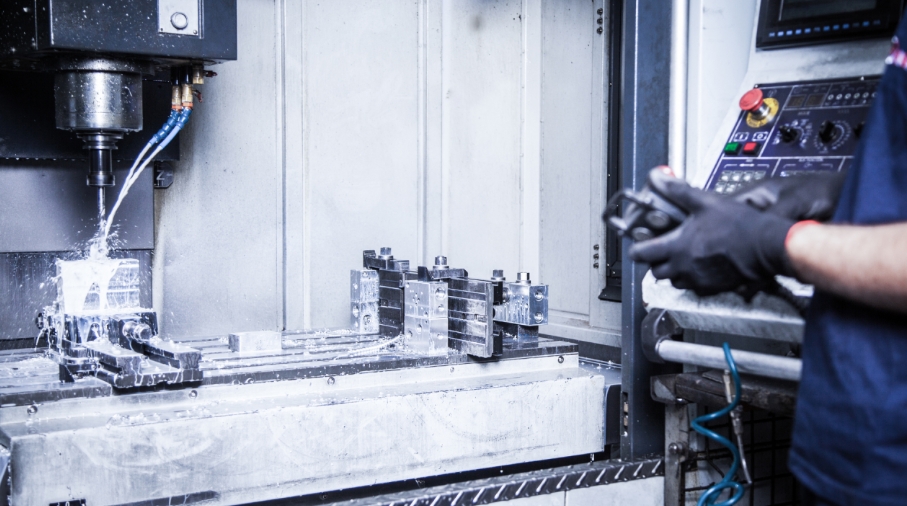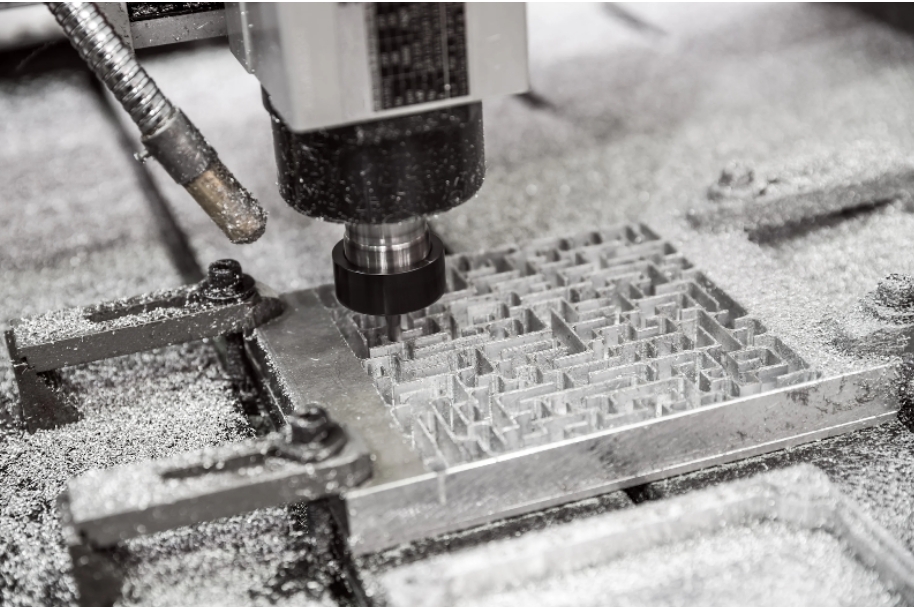CNC milling machine cutting metal in a precision machining shop
Thinking of starting your own CNC machine shop? Then this guide is for you. Starting your own CNC machining shop is exciting, but full of challenges and rewards. Most of the metal parts you see in everyday items like cars, ships, medical devices, and planes come from precision CNC machine shops. So imagine how many businesses rely on these shops to create innovative devices.
CNC machine shops are equipped to handle all sorts of metal and material production. But setting it up require more than your technical skills; you will need a mix of knowledge across having a good business sense, smart planning, and paying attention to detail for accuracy and precision.
Looking complex already? Don’t worry, this blog is here to guide you through the process of setting up your CNC machining shop. You will understand the purpose of CNC machining shop, you will also know how to set up a CNC machining shop taking note of the two major type of machine shop – Factory integration and pure trading machine shops.
What is a CNC Machine Shop For?

Technician operating CNC lathe in a factory integration CNC machine shop
A CNC machine shop, also known as a CNC machining shop, is where advanced technology and skilled innovation come together to create precise parts and products. Think of a CNC machine shop as a modern workshop where expert technicians use state-of-the-art equipment to produce parts that meet client exact specifications. These shops are vital for industries requiring high-quality components, such as aerospace, automotive, medical devices, and electronics.
CNC machining shops aren’t just about cutting and shaping materials. They also focus on ensuring every piece produced meets strict quality standards. This is where the term “precision CNC machine shop” comes into play. Precision is crucial in CNC machining because even the smallest error can affect the functionality of the final product. That’s why these shops invest in the latest technology and employ highly skilled technicians who understand how these CNC machines work.
A local CNC machine shops offer numerous services such as milling, turning, drilling, and grinding. By combining different techniques, a CNC precision machine shop can handle a wide range of projects, from simple components to intricate assemblies. Some specialize in small, high-precision parts, while others focus on large-scale production.
How to Set Up a CNC Machining Shop
Industrial CNC milling machine in operation at a manufacturing facility
Setting up a CNC machining shop is a comprehensive process that includes these processes; advanced technology, precision engineering, and entrepreneurial strategy. This guide will take you through the steps needed to establish the two types of CNC machine shops: factory integration and pure trading machine shops. Here are the details:
- Factory Integration CNC Machine Shops
Factory integration CNC machine shops are designed to be part of a larger manufacturing process. These shops often exist within a broader factory setting, where they work in conjunction with other production processes.
- Define Your Objectives:
Firstly, you will need to determine the specific needs of your factory. Are you focusing on high-volume production, or do you require flexibility for producing a variety of components? Understanding your production goals will guide your equipment choices and layout.
- Choose the Right CNC Machines:
Selecting the right CNC machines is critical to the success of your precision CNC machine shop. There are several CNC machines you will be needing in your shop, the main you will need to consider are; CNC mills, lathes, routers, and grinders.
Each of these type of CNC machines serves a different purpose. CNC mills are ideal for cutting and shaping metal and other materials, while CNC lathes are used for turning operations, creating cylindrical parts. But you can do a survey on what CNC machining services are required around your regions, this will determine what machine your shop should contain.
- Plan Your Layout:
To maximize the productivity of parts in your CNC machine shop, you have to design an efficient layout. Place the CNC machines you have purchased in a logical flow that minimizes material handling and which will in-turn ensure a smooth production process. Ensure there is adequate space for operators to move around safely and for maintenance activities.
- Hire Skilled Personnel:
CNC machining requires the best experts for operation to give an excellent production that suits your client goals. Ensure to recruit skilled CNC operators, programmers, and maintenance technicians. Your operators should be proficient in machine setup, tool changes, and part inspection. While, your programmers must have expertise in CAD/CAM software to create accurate and efficient machining programs. Maintenance technicians should be capable of performing regular maintenance and troubleshooting any issues that arise.
- Implement Quality Control and Industry Standards:
In the CNC machining sector, there are certain industry standard certification that would be required by your client before they get in business with you. Like Zintilon, the certification to acquire include; ISO 14001:2015, ISO 9001:2015, ISO 13485:2016, IATF 16949: 2016, and AS9100D. And ensure you set up a solid quality control system to ensure the accuracy and precision of your CNC machined parts. Establish clear quality standards and procedures for every stage of the production process, from raw material inspection to final product verification.
- Pure Trading CNC Machine Shops
Pure trading CNC machine shops focus on being an intermediary between external clients and manufacturing companies, rather than integrating into a larger manufacturing process. These shops cater to various industries. Here’s how to set up this kind of shop:
- Identify Your Market and Best manufacturing partner:
Understanding your target market is the foundation of a successful pure trading CNC machine shop. Research potential clients and industries that need CNC machined parts. Identify sectors with high demand for precision components, such as aerospace, automotive, medical devices, and electronics. When you have gotten your client base, the next step is to research on the best CNC machining manufacturing companies. While doing so, ensure your pick has the required industry standard certifications needed to produce a high-quality component for your client.
- Secure Funding:
Determine your budget and explore funding options. Setting up a CNC shop requires a significant initial investment, which include the cost of workspace, logistics and initial operating expenses. You can explore the various funding sources such as bank loans, government grants, venture capital, or personal savings.
- Select a Suitable Location:
Choosing a strategic location is crucial for your shop’s success. Consider factors such as proximity to suppliers and clients, availability of skilled labor, and rental costs. A location with good transportation links can facilitate easy access to manufacturers and timely delivery of finished products to your clients.
- Hire and Train Staff:
Hiring skilled CNC experts and negotiators is critical to the success of your shop. Look for candidates with experience in operating and programming CNC machines, as well as a strong understanding of machining processes that could understand client’s need and bargain a reasonable fee with the manufacturers. You can provide training to ensure they are proficient for the services your CNC machine shop will need.
- Develop a Marketing Strategy:
Create a marketing plan to attract clients and build your reputation in the industry. Develop a professional website like Fictiv showcasing your capabilities, previous work, and client testimonials. Utilize online advertising, social media, and industry-specific forums to reach potential clients.
- Focus on Customer Service:
Building strong relationships with your clients is key to long-term success. Ensure clear communication throughout the production process, from initial inquiries to final delivery. Address any concerns promptly and provide regular updates on project status.
Here’s a table showing how to set up a factory integration CNC machine shop and a pure trading CNC machine shop:
| Step | Factory Integration CNC Machine Shop | Pure Trading CNC Machine Shop |
| Define Your Objectives | Determine specific production goals within a larger manufacturing process. Focus on integrating with existing factory operations for seamless production flow. | Identify target markets and client needs for precision components. Aim to act as an intermediary between clients and manufacturing companies. |
| Choose the Right CNC Machines | Select CNC mills, lathes, routers, and grinders based on factory production needs. Machines should integrate smoothly with existing factory processes. | Partner with CNC manufacturing companies that possess necessary certifications and capabilities. Ensure selected machines can meet diverse client demands across various industries. |
| Plan Your Layout | Design an efficient layout that optimizes workflow within the factory setting. Minimize material handling and ensure safe operator movement. | Choose a strategic location with proximity to suppliers, clients, and skilled labor. Optimize space for material storage and production workflow. |
| Hire Skilled Personnel | Recruit skilled CNC operators, programmers, and maintenance technicians proficient in factory operations and maintenance. Ensure they understand integrated production processes. | Hire skilled CNC experts capable of negotiating contracts and managing client relationships. Provide training on understanding client needs and negotiating with manufacturers. |
| Implement Quality Control | Obtain industry certifications (e.g., ISO 9001:2015, AS9100D) to ensure compliance with quality standards. Establish rigorous quality control measures across factory operations. | Partner with manufacturers holding required certifications to ensure quality component production. Implement quality assurance measures from supplier selection to final product delivery. |
| Secure Funding | Plan for initial setup costs, including machinery acquisition and factory integration expenses. Explore funding options like loans or grants for manufacturing investments. | Determine budget requirements for shop setup, including machinery, logistics, and operational expenses. Seek funding through loans, grants, or venture capital to cover initial costs. |
| Develop a Marketing Strategy | Promote integrated capabilities within larger manufacturing sectors. Highlight factory efficiency and production scalability. | Develop a marketing plan to showcase CNC machining capabilities. Create a professional website and utilize online platforms to reach potential clients. |
| Focus on Customer Service | Maintain close communication with factory partners to ensure seamless integration and client satisfaction. | Build strong client relationships through excellent customer service and transparent communication. Address client concerns promptly and provide regular updates on project progress. |
Conclusion
Setting up a CNC machining shop is both challenging and exciting, whether as part of a larger factory or a pure trading operation, involves careful planning and execution. By following these steps; defining your goals clearly, understanding what you want to achieve, how your shop will meet market demands, choosing the right CNC machines, and paying attention to details, you can create a successful CNC machining business that meets your goals and serves your clients with precision and reliability.
Kindly remember that the key to the success goes beyond just having technical expertise, but you must also mix it with smart business strategies. Ensure to always go for excellence, learn from challenges, and use every experience to refine your craft. And with your determination to own a successful CNC machine shop will be turned into reality, that surpasses expectations.






